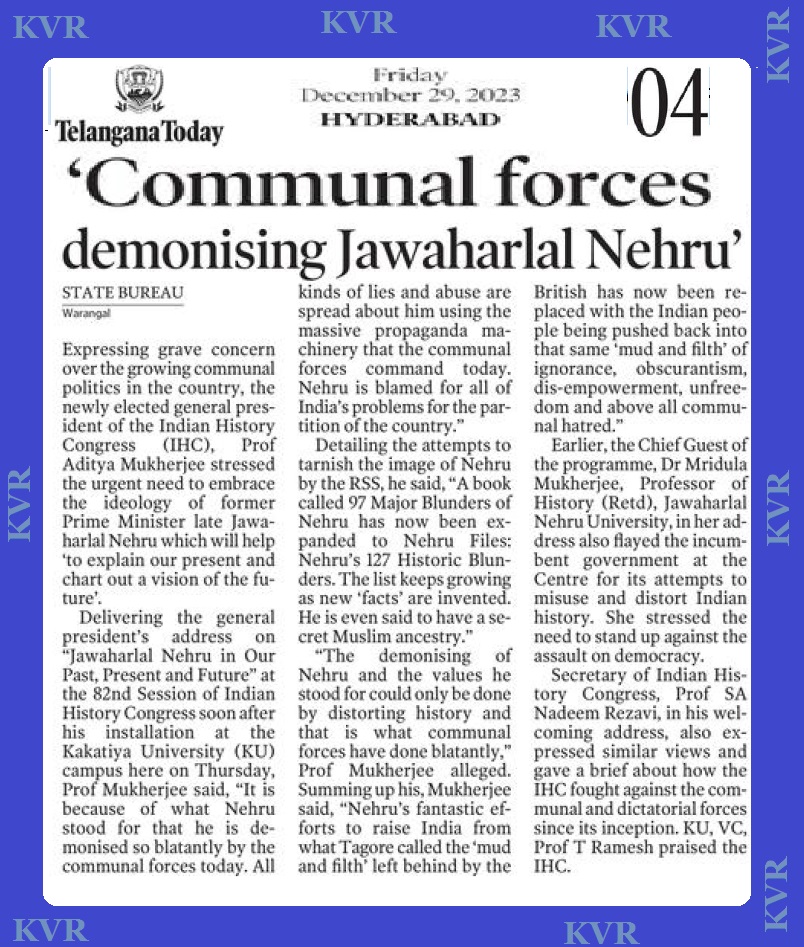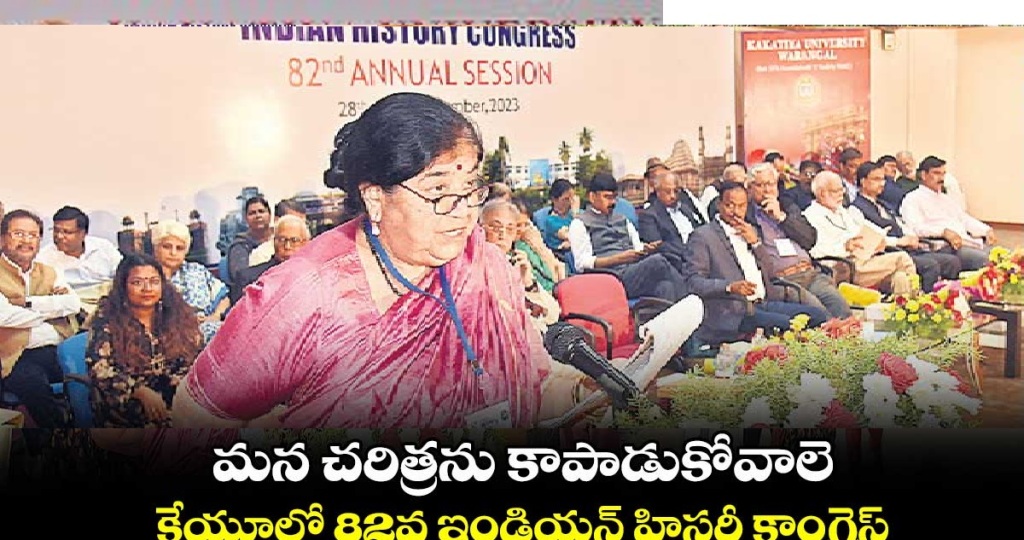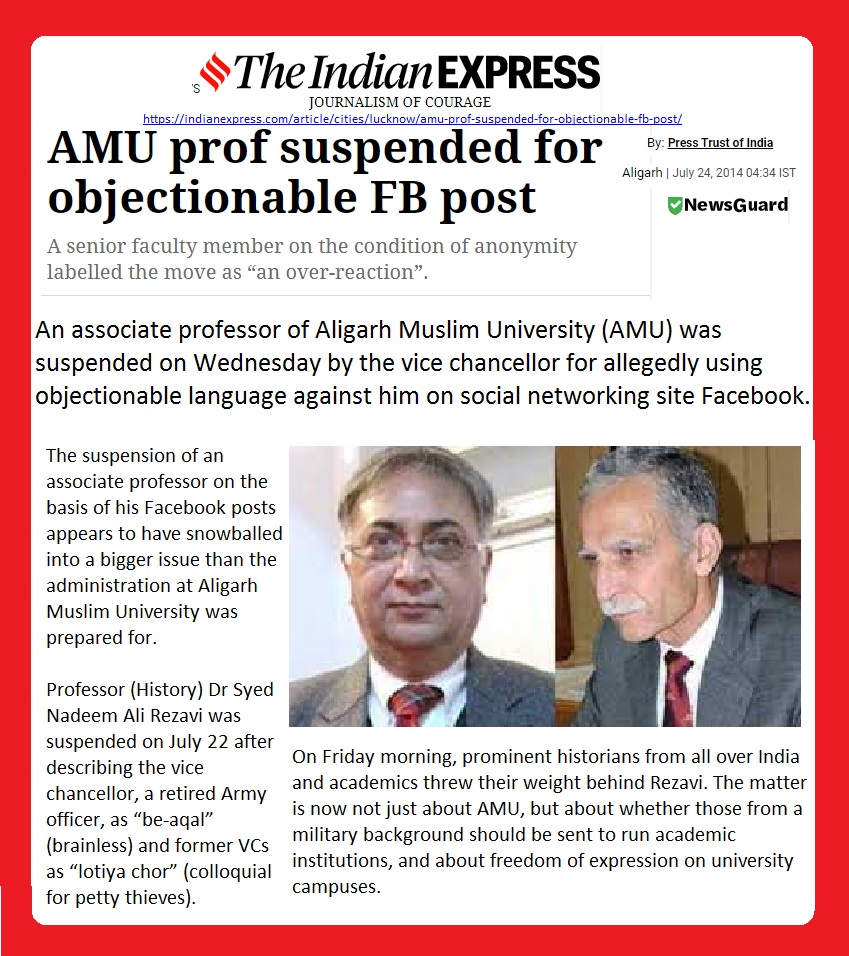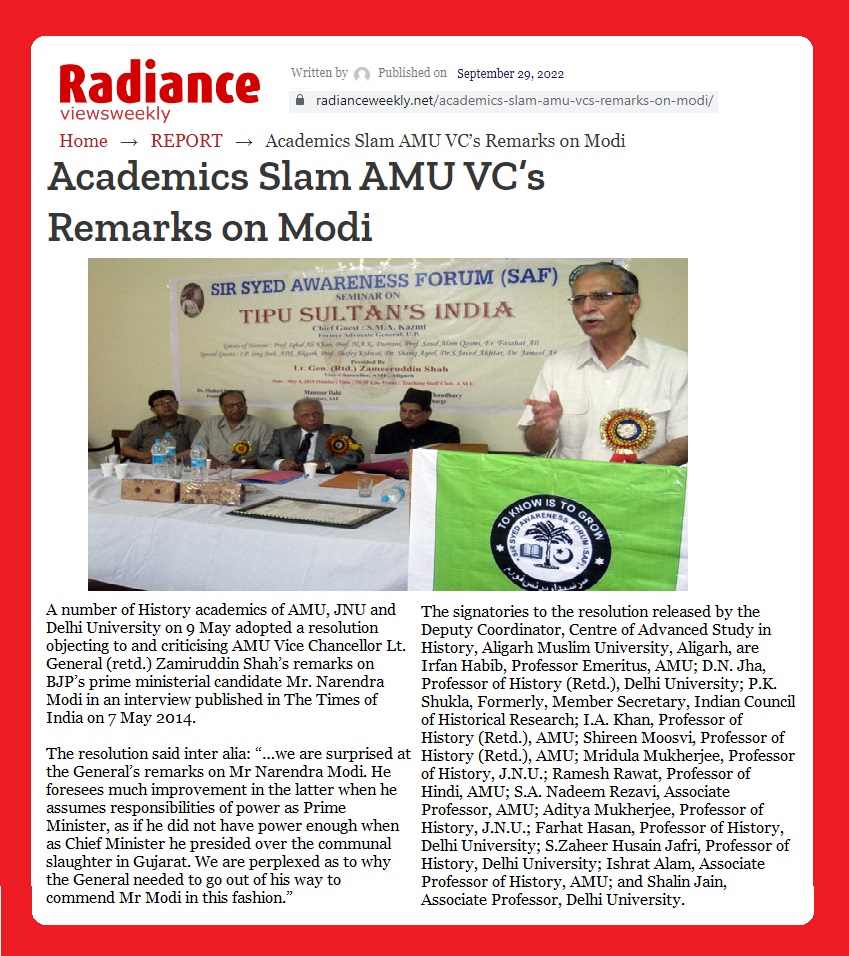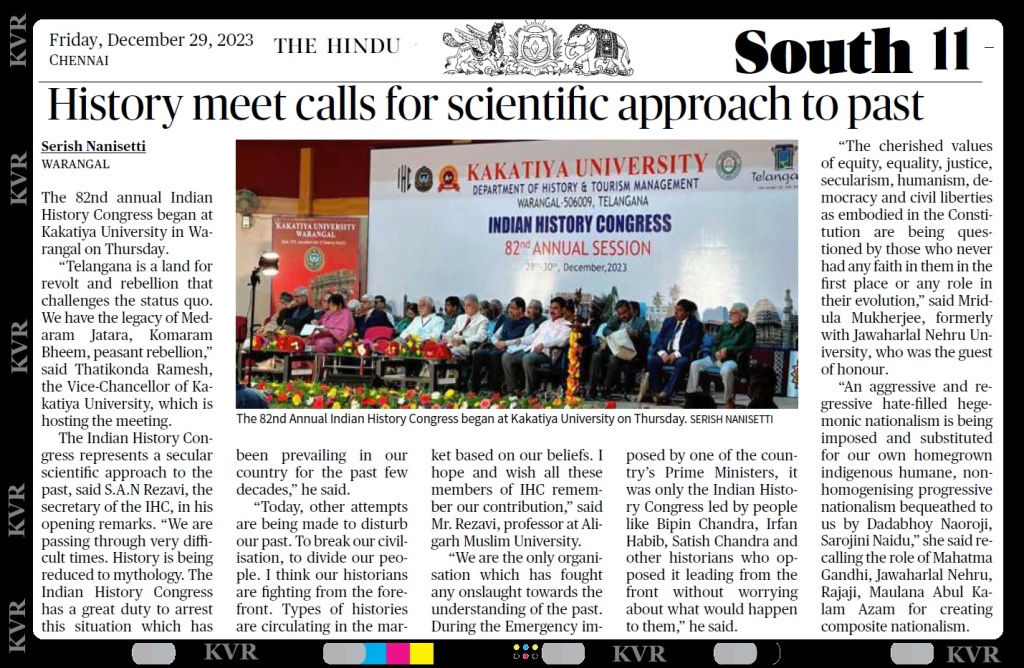Is it difficult to write 100-200 years old history faithfully and honestly in the Indian context? Mythologization of modern leaders (2)

Only few Indians know all other leaders: Very often, people groups talk about their leaders like – Gandhi (1869-1947), Nehru (1889-1964), Patel (1875-1950), Bose (1897-1945), Rajaji (1878-1972), Jinnah (1876-1948), Ambedkar (1891-1956) and other mainstream heads and regional chiefs of the states. Though, thousands of other leaders, religious heads, scientists and others were there, they may not be known to all Indians, as they were not made publicized. Even after the spread of print and electronic media, such tendencies continue. Though, it cannot be called as censor, the influenced and controlled media has agenda to do so. The media allows the programs, news and other features only that are decided by the choice of the owners and not that of the viewers. Slowly such enforced burden continues and the viewers are accustomed to such imposed programmes. In the same way, the history writers and historiographers also decide what they write and what they do / should not write.

All Indian leaders should be studied: As the Indian recent history covers 100-200 years, definitely, the leaders of India, Pakistan, Bangladesh, Sri Lanka etc., may have also to be added. For the Bengalis, it is very familiar, as they used to get news about the nearby states including Myanmar, Thailand and beyond[1]. So also, the Punjabis still remember and get the news of their relatives, who are still in the Western Punjab in Pakistan. The relation of the Tamils of Tamilnadu with that of Sri Lanka is viewed carefully and seriously. But, the Indians of other states do not get such details.After all, Jinnah lived in India and his house is there in Bombay / Mumbai[2]. But, when Jinnah. EVR, Ambedkar and others decided to meet, they met at the house of Ambedkar and not at that of Jinnah. In fact, many, including historians do not know that Jinnah, EVR and Ambedkar met together. No historian or researcher raised any question about it. Historians do not talk about Western Punjab and East Bengal or East Bengal and West Bengal. Therefore, it is imperative that Indian students should read about the leaders of other states also.

The history of the leaders of India, pre-1947 India and after 1947 India: How these leaders acted, reacted and counter-acted can be noted during the British rule, before and after independence. Particularly, the study of separatist leaders has been interesting. Though millions of documents, lakhs of books and thousands of photos are available, not all are available in the public domain. Not all of them were handed over to India by the British and Indian government also made them open to all. Of course, when the Indian historians become biased, their likes and dislikes changed completely. When most of the senior leaders started dying after independence because of age, the next generation of leaders have not been so, the current generation lost the chance of knowing facts about them. When India itself was divided into Afghanistan, Pakistan, Tibet, Nepal, Burma and Sri Lanka either by administrative convenience or freedom struggle, separation created in knowing the leaders of other countries carved out of the “British India. ” When the formation of linguistic based states within India completed, such exclusivism arose among the linguistic groups. Thus, the pre and post-1947 Indian history makes a lot of difference.

The politics of statue erection: Till 1970-80, Ambedkar was not known to the south, particularly, the Tamilnadu people. The DK-DMK leaders also did not bother about him. Their speeches and writings show the fact. As they give importance and publicity about him, they did not do the same of them some 40-50 years back. But, suddenly, 1980s onwards, thousands of Ambedkar statues started appearing in Tamilnadu. At that time some even questioned, why statues for a person, who was not a Tamilian. Many Tamilnadu political and other leaders claim that they are the heir of Ambedkar and produce all sorts of rhetoric literature accordingly. Even if Prakash Ambedkar or Anandraj Yaswant Ambedkar comes to Tamilndu, they might be surprised or shocked to note how many are claiming the heir-ship. Mayavati started installing her statues in UP[3], just like what the Dravidian leaders did in Tamilnadu. Ironically, when the statue of Karunanidhi was installed, while he was alive, it was demolished on the occasion of death of his political rival MGR in 1987. Later, as mentioned above, the Ambedkar statues were started to be installed throughout Tamilnadu. The DK also joined the race with the installation of EVR statues everywhere. Thus, statue erection has beome a political culture in India.

Statue-tomb culture increasing in Tamilnadu: Now, perhaps none can / could point out the facts of the Dravidian leaders now elevated to divine level. Crores are spent to build memorials, buildings and other spots year by year. Thus, during the last 70 years, more and more neo-political-spiritual places are created. The tomb culture has already started from 1970 and now in Madras / Chennai, most of the Marina beach has been encroached by the tombs of C.N. Annadurai, M.G. Ramachandran, Jayalalita and M. Karunanidhi. There is a joke that every CM might reserve a place in the Marina Beach for the purpose. Their places of tombs have been constructed, reconstructed, renovated, modified, enlarged many times spending crores of money. Evidently, a new type of cult has been created and none can criticize such sectorial rituals, factional rites and group lirugy. The yearly rituals and ceremonies are conducted on the days of birth, death and other occasions. The beach has also been lined with many statues and they are increasing year by year. “Manimantapam” has become a routine affair and it is declared for every leader, evidently chosen based on caste, religion and other sectarian reasons. Under such circumstances, only esteemed eulogy, superlative tributes, and praising elegy are only allowed. The life-histories of all these leaders are not written or know to the public. Thus, tomb-statue culture also suppress the facts of the leaders.

Mythologization of life-histories of leaders: Even among the State / regional leaders like – Sheik Abdullah, Jagjivan Ram, Karpoori Thakur, Om Prakash Chautala, Charn Singh, Prafulla Kumar Mohanti, Lal Denga, Jyoti Basu, Biju Patnaik, N. T. Rama Rao, E. V. Ramasami Naicker, Potti Sriramulu, Nambudripad, Ramakrishna Hegde, Bal Thackery, Vijayaraje Sindia, Man Mohan Singh, etc., many of them are forgotten now. Only for illustrative purposes, few leaders have been mentioned and it is not exhaustive list. In many cases, their real life-histories have been mythologized, though, they lived just 100 years back and some are living also. The regional parties, of late, have been trying to mythologize and portray their leaders in the new cast, so that the past is erased or completely changed. As the political and social leaders are claimed by different parties, they try to project them to suit their ideology and hence suppress the facts that are not suitable to them. Thus, the suppression of facts work in different ways with the modern mythologization. Here, also no historian or researcher gives 100% authentic biography, yet, lessons are included in the textbooks for students to read and answer as per the designed pattern, as otherwise, the students cannot get marks and even pass the exams.

How facts are suppressed[4]: Generally, negationism[5] is applied to suppress all the negative aspects of life of any particular leader and new positive aspects are added year by year by the followers, disciples and admirers. However, as the relatives, friends and contemporaries live even today, they know the facts and hence, they point out in incorrect projection of such leader. Here also such persons are threatened or warned not to meet any persons, give interview and so on. Thus, the old persons of 70 to 100 years old are also prevented to tell the truth. Of course, in the 100-200 years newspapers also, some news would have come and researcher could find out. Here also, the researchers are harassed and access denied maximum. They are asked to come again and again, send back on flimsy pretext and thus, they too stop coming. Yet, such details are prevented to be recorded in the mainstream media, books and journals. Even in the research journals, conference proceedings and seminar compilations, certain vested interests see that they are excluded. Thus, systematically such details are suppressed forever and in due course, they are forgotten.
© K. V. Ramakrishna Rao
15-05-2024

[1] The Greater India Society for the study of Indian culture in East, South East and Central Asia. The terms the Society used in its aims and objects to describe the vast geographical expanse of what it felt constituted ‘Greater India’ now are largely forgotten and perhaps sound somewhat archaic: ‘Serindia, India Minor, Indo China and Insulindia’ referring respectively to what corresponds now roughly to modern Xinjiang, India, South East Asia and North West Pakistan, Afghanistan and parts of Iran.
[2] Jinnah Mansion, also known as the South Court, is an unoccupied house in Malabar Hill, a premium neighbourhood of the city of Mumbai in India associated with Muhammad Ali Jinnah, the founder and first governor-general of Pakistan. It was built by Jinnah and remained his main residence for 10 years until he left in 1946 for Karachi.
[3] Mayavati justified before the Supreme Court during the hearing in 2009 petition against the profusion of statues of Mayawati, her mentor Kanshi Ram and elephants – her party Bahujan Samaj Party (BSP)’s symbol – built at parks in Lucknow and Noida with taxpayers’ money when she was chief minister between 2007 and 2012. The statues of bronze, cement and marble had critics accusing her of self-obsession and megalomania.
[4] As the author himself has faced and undergone all such problems, such exigencies can be explained in detail, yet, it is not possible.
[5] Historical negationism, also called historical denialism, is falsification or distortion of the historical record. It should not be conflated with historical revisionism, a broader term that extends to newly evidenced, fairly reasoned academic reinterpretations of history. In attempting to revise the past, historical negationism acts as illegitimate historical revisionism by using techniques inadmissible in proper historical discourse, such as presenting known forged documents as genuine, inventing ingenious but implausible reasons for distrusting genuine documents, attributing conclusions to books and sources that report the opposite, manipulating statistical series to support the given point of view, and deliberately mistranslating texts.
Filed under: ambedkar, ambedkar idea, ambedkar ideology, ambedkar philosophy, anti-brahman, anti-brahmin, anti-caste, anti-hindu, anti-india, anti-indian, arya, bihar, Delhi, Dravida, Dravidam, dravidar, Dravidi, Dravidian, election, ethnicity, gandhi, historical politician, historicity, historiography, ideological, ideology, linguistics, linguistuic study, myth, mythologization, mythology, nation-state, political correctness’, political historian, politics, president, race, racialism, racism, reddy, secession, sectarian, sectarian faith, sectarianism, secular, secular historian, secular historiography, secular history, sikkim, statue, syllabi, Tamil Brahmi, tamil sectarianism, tamil separatism, tamili, telangana, telengana, tribe, Vajpayee, vora, wheel, worker, young, youth | Tagged: ambedkar, anna, annadurai, arya, aryan invasion, aryan problem, aryan race, autonomy, C. N. Annadurai, country, dk, dmk, Dravida, Dravidam, dravidan, Dravidar, evr, history, India, jaya, jayalalita, karunanidhi, mgr, naicker, nation, nation-state, pakistan, periyar, politics, race, racialism, racism, state | Leave a comment »





































